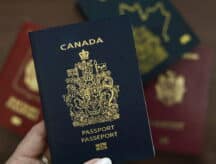IRCC’s tips on getting your police certificate
Applicants in various immigration programs—including those responding to an invitation to apply (ITA) for permanent residence (PR)—will need to submit personal documents in support of their application, including police certificates.
Police certificates are statements that an applicant does not have a criminal record, or if they do, it is a copy of their criminal record. These documents can be different from country to country, and may also be referred to (among other names) as:
- police clearance certificates;
- good conduct certificates; and/or
- judicial record extracts.
Applicants may need a police clearance certificate from the country where they currently reside and/or countries they have resided in before the submission of their application for PR or temporary residence (if one has declared a criminal record in their application). Note that applicants do not need a certificate from every country that they have ever lived in—rather police certificates are required for every country an applicant has lived in after the age of 18, for six or more months in a row, within the last 10 years.
These certificates are used to satisfy criminal admissibility clearance requirements for immigration (verifying that a newcomer is not likely to engage in criminal action once they arrive in Canada). The process for procuring these documents may vary but they are essential for many people on their Canadian immigration journey.
Immigration Refugees and Citizenship Canada (IRCC) has compiled information to help individuals apply for and receive a police certificate. Read on for a country-by-country breakdown.
Note: IRCC advises that submitting biometrics data for a police certificate (i.e.: fingerprints) is not the same as submitting one’s biometrics directly to IRCC for immigration needs.
This article covers procedures to receive a police certificate from:
- Canada;
- India;
- United States of America;
- Nigeria;
- Pakistan;
- Bangladesh;
- United Arab Emirates;
- Phillippines;
- United Kingdom; and
- Nepal.
Discover if You Are Eligible for Canadian Immigration
Canada
In Canada, immigration applicants require a document called a “criminal record check” in support of their application.
Immigration applicants who apply for PR from within Canada do not need to submit a police certificate at the time of submitting their application. If a criminal record check is needed the department will inform applicants while their application is in process.
Those who require a criminal record check are advised to check the Royal Canadian Mounted Police (RCMP) website for instructions. Special considerations are also included for the submission of fingerprints.
Further information can be found on the RCMP website here.
India
Immigration applicants in, or having previously resided in India will require a “Police Clearance Certificate” in support of their immigration application.
Applicants can apply for a Police Clearance Certificate at:
- Their local district police station;
- Passport office;
- Indian embassy or consulate; and/or
- BLS International Centre.
Applicants should note that:
- Character certificates (another type of police certificate) are not accepted by IRCC;
- Some Police Clearance Certificates have limitations on the jurisdiction or time period that has been cleared by the police. These certificates are also not accepted; and
- Formats for Police Clearance Certificates may vary depending on the issuing authority.
Further information on the Passport India website can be found here.
United States of America
Applicants from, or who have previously lived in the United States need an “Identity History Summary” from the Federal Bureau of Investigation (FBI), to meet criminal admissibility requirements.
If individuals apply for criminal rehabilitation, a temporary resident permit (TRP), and/or an authority to return to Canada (ARC) authorization, they need to submit state certificates in addition to an Identity History Summary.
Applicants can request an Identity History Summary from the FBI online.
Contact information for the FBI Criminal Justice Information Services Division can be found here.
Nigeria
Applicants in (or having previously lived in) Nigeria need a “Police Character Certificate” in support of their immigration application.
There are two ways that individuals can apply for this certificate.
Applying in person at the Central Criminal Registry
When applying in person, applicants must bring:
- Their valid passport;
- Two passport-sized photographs; and
- Applicable fees.
Applying by mail to the commissioner of police
When applying by mail applicants must bring:
- A pre-paid return courier envelope;
- A copy of their passport photo page;
- A set of fingerprints taken by a recognized police authority, Nigerian embassy, or consulate; and
- An international money order payable to the Nigerian Police Force CID (Criminal Investigation Department).
Applicants should note that police certificates can be certified at the nearest Nigerian embassy or consulate for a fee.
Contact information for the Central Criminal Registry Force can be found here.
Pakistan
Applicants in (or previously living in) Pakistan need either a “Police Character Certificate” or a “Police Clearance Certificate” in support of their application.
Applying for either of these documents in Pakistan can have different procedures depending on whether one applies from a larger city, a smaller city, town, or rural area, or a Federally Administered Tribal Area (FATA).
Needed documents to apply can also change depending on whether an applicant is outside of Pakistan, and if they are not a citizen of Pakistan—though most variations still require an application form.
IRCC notes that the Canadian High Commission in Islamabad cannot help applicants receive a police certificate.
Bangladesh
Applicants currently in, or who have previously lived in, Bangladesh will require a “Police Clearance Certificate” to meet security requirements for immigration.
If applicants are citizens of Bangladesh who are in the country, they may apply at their local police station. If these individuals are not in Bangladesh at the time, they may also authorize a third party on their behalf to apply at the local police station; or contact the Bangladesh Embassy, Consulate, or High Commission.
If applicants are not citizens of Bangladesh, the same rules apply (whether inside or outside of Canada).
To apply for a Police Clearance Certificate, individuals will need:
- Their valid passport; and
- Applicable fees (payable with a bank draft from the Bangladeshi bank or any branch of the Sonali bank).
United Arab Emirates (UAE)
Applicants who are in, or who previously lived in, the UAE will require either a “Police Clearance Certificate” (issued by individual Emirates), a “Criminal Clearance Certificate” (issued by the national government), or a “Good Conduct Certificate”; in support of their immigration application.
Applicants in the UAE can apply:
- In-person or through authorizing a representative (friend, relative, colleague) with a power of attorney—at the police department in their respective emirate;
- Online at the Dubai Police website; or
- In person at the nearest UAE Embassy.
Note that applicants submitting a Police Clearance Certificate need only apply for one document from any emirate.
Contact information for each police department is available here.
Philippines
Applicants who are in, or who previously have resided in, the Philippines will require a “National Bureau of Investigation (NBI) Multi-purpose Clearance Certificate” in support of their immigration application.
If the NBI certificate includes any of the following statements: “NO CRIMINAL RECORD”, “NO PENDING CASE,” and/or “RECORD AS STATED” applicants are asked to submit additional documentation including:
- A written explanation from the NBI regarding the statements;
- All court documents for any criminal charges, including complete copies of the decision/resolution of the case; and
- The applicant’s explanation of the incident leading up to the charges.
Applicants can apply for their NBI Multi-purpose Clearance Certificate either:
- Online or in-person at any NBI office; or
- In person at the nearest Philippine Embassy or Consulate; or
- By mail at the National Bureau of Investigation head office.
Note that certificates must have a thumbprint and include a dry seal. NBI certificates must be picked up in person, or (if the applicant is outside of the Philippines) by mail.
Contact information for the National Bureau of Investigation can be found here.
United Kingdom
Applicants in or having resided in the United Kingdom (England, Wales, Scotland, Northern Ireland, Channel Islands, and Gibraltar) will require a “Police Certificate” to meet security clearances needed for immigration.
To apply, newcomers will need:
- A recent digital passport-style photograph in JPG, GIF, or PNG format with a maximum file size of 3MB;
- Color digital copies of their passport or travel document. These each need to be in JPG, GIF, or PNG format with a maximum file size of 3MB;
- A valid email address;
- Their address history for the last 10 years; and
- A valid debit or credit card to make payment.
If applying on behalf of another adult, applicants will also be required to provide some additional information. Detailed instructions can be found at the National Police Chief’s Council (NPCC) Criminal Records Office website here.
If an applicant receives a Police Certificate that states “No Live Trace”, they will have to provide further information or documentary evidence on their record (if available)—specifically, applicants are encouraged to include a detailed statement of their offense, which describes:
- The offence(s);
- The sentence(s);
- Relevant dates within the case; and
- Any other information relevant to the case.
- Further information can be found on the Criminal Records Office website.
Contact information for the Criminal Records Office can be found here.
Nepal
Applicants in or who have resided in Nepal will require a “Police Clearance Certificate” to meet the security clearances needed for immigration.
Police Clearance certificates can be applied online through the Online Police Clearance Registration System of the Nepali police.
Contact information for the national police force can be found here.
For more information on country-specific processes to apply for and receive a police certificate, find IRCC’s dedicated webpage here.
- Do you need Canadian immigration assistance? Contact the Contact Cohen Immigration Law firm by completing our form
- Send us your feedback or your non-legal assistance questions by emailing us at media@canadavisa.com







